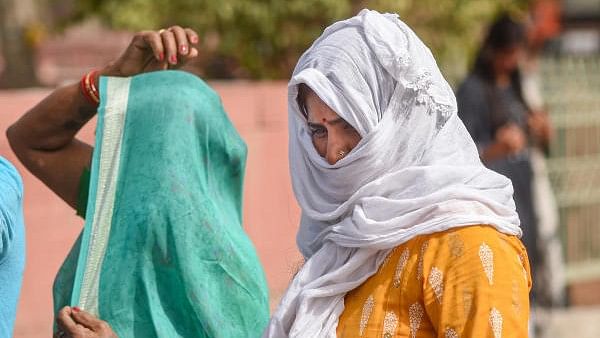
Women use scarves to shield themselves from the heat.
Credit: PTI File Photo
By Chiranjivi Chakraborty and Harshita Swaminathan
India’s sweltering summer is the latest worry for companies already hit by slowing earnings growth and ongoing supply chain disruptions.
The heat wave featured no fewer than 80 times in earnings calls for the quarter ended June — an all-time high — data of Nifty 500 companies compiled by Bloomberg showed. That’s a significant jump from just seven mentions in the year-ago period.
India faced near-record temperatures this summer as a devastating heat wave gripped most parts of the country including its financial hub Mumbai and the capital city of New Delhi. This affected footfalls at retailers, hindered labor productivity at construction firms and made it more difficult for lenders to collect loan payments.
“One risk that I tend to mention for India is climate change” when investors ask about the biggest risks facing the nation’s stock market rally, said Jonathan Garner, chief Asia and emerging market equity strategist at Morgan Stanley.
Of the 46 NSE Nifty 50 Index members that have posted results so far, about half missed the average analyst estimate. That’s a sharp increase from the previous three months, where 39 per cent firms missed expectations.
Credit: Bloomberg
While heat wave was a recurring theme in many earnings transcripts, high raw-material costs driven by geopolitical tensions in the Middle East and disruptions to shipping routes were also significant factors.
Food delivery firm Zomato Ltd. said the heat wave was one of the factors that led to sequentially lower margins. Infrastructure giant Larsen & Toubro Ltd. said it tried mitigating the heat risk by having worker shifts early in the morning and late in the afternoon.
Worsening climate conditions have yielded some winners too. Whirlpool of India Ltd. and stabilizer manufacturer V-Guard Industries Ltd. benefited from summer-led demand. Power generators including state-owned NTPC Ltd. reported better-than-expected sales in the June quarter, partly boosted by a record demand in the summer months.
Credit: Bloomberg
For the rest, the situation will only get tougher as extreme weather incidents are expected to surge. In the next 30 years, the length of heat waves in India is set to increase 25-fold, according to Group of 20’s Climate Risk Atlas.
“We see inconsistencies in the market’s pricing of climate risks,” said Vlad Byalik, emerging markets value portfolio manager at Ariel Investments LLC. “Market often overreacts to short-term events while under-appreciating longer-term trends, which is in part driven by the climate issue.”